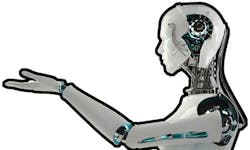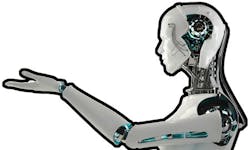Robotic assistance: Socially assistive robots could be influencing oral health outcomes soon
By JoAnn Gurenlian, RDH, PhD
Do you have patients who are truly challenged by their oral home-care regimen? Perhaps they have special needs or are recovering from a stroke or other illness that leaves them limited in dexterity. Some patients suffer from mental illness and need motivation to perform daily activities such as toothbrushing and using mouthwash. Skills that we might take for granted can be daunting and even demoralizing to someone who has a lifelong condition or is in rehabilitation.
Enter Dr. Maja Matarić, a professor of computer science, neuroscience, and pediatrics at the University of Southern California. Dr. Matarić oversees the development of socially assistive robots, intelligent machines designed to help patients with rehabilitation and training using social interactions to change behavior. She and her colleagues have been studying these robotic devices for 15 years for use in stroke rehabilitation, autism behavior therapy, and individuals with dementia and traumatic brain injury as a way to help coach and motivate them to perform tasks they are struggling with or less inclined to perform.
This field of study involving socially assistive robots is fascinating, because it recognizes that individuals often know what to do and how to perform tasks, yet they require significant help with motivation, coaching, and support through the process of recovery and rehabilitation. Staffing resources are not always available, and home care may be a challenge. In her work using socially assistive robots, Dr. Matarić has found that people who interacted with the robots felt cared for; liked the robots more than computers, phones, or apps; and were more likely to perform the necessary exercises so they could recover more willingly. People were emotionally engaged with the robots; children with autism found the robots provided a catalyst for social play, and the robots were able to respond appropriately to the person’s needs.
Dr. Matarić projects that within the next five years, socially assistive robots will be more available within homes and community settings for other behavioral change uses, and this has me thinking about our patients who have oral health needs.
We already have powered toothbrushes with new technology that offers features with feedback to help patients learn how to brush better. It occurred to me that the companies that manufacture these toothbrushes might want to partner with the groups that create socially assistive devices to develop a platform to help patients with significant health challenges recover both the dexterity and motivation to perform self-oral-care regimens. Imagine how empowering it would be for patients to have a sense of accomplishment and independence from caregivers to be able to hold that toothbrush in their hand, control it while using it in the mouth, and successfully remove biofilm and food products themselves. Think about how proud a person would be when coming in for a regularly scheduled dental hygiene appointment, knowing he or she was able to achieve a healthy mouth independently.
This technology would be a revolutionary step forward for so many patients who cannot meet their own oral health goals unassisted. This partnership would help remind therapists and caregivers that the mouth is still connected to the body, and it would be a reminder that good oral health is good health. Further, this adaptive technology could be available in all the same settings: hospitals, rehabilitation centers, nursing homes, group homes, schools … anyone’s home.
Imagine, as Dr. Matarić does, a future in which there is a robot for every person so everyone has a platform for health and wellness, as well as the motivation to have help with individual health challenges. That would be incredible! RDH
JOANN R. GURENLIAN, RDH, PhD, is president of Gurenlian & Associates, and provides consulting services and continuing education programs to health-care providers. She is a professor and dental hygiene graduate program director at Idaho State University, and past president of the International Federation of Dental Hygienists.

